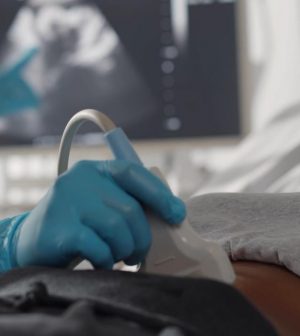- Could Your Grocery Store Meat Be Causing Recurring UTIs?
- Are You Making This Expensive Thermostat Error This Winter?
- Recognizing the Signs of Hypothyroidism
- 10 Strategies to Overcome Insomnia
- Could Artificial Sweeteners Be Aging the Brain Faster?
- Techniques for Soothing Your Nervous System
- Does the Water in Your House Smell Funny? Here’s Why
- Can a Daily Dose of Apple Cider Vinegar Actually Aid Weight Loss?
- 6 Health Beverages That Can Actually Spike Your Blood Sugar
- Treatment Options for Social Anxiety Disorder
Many Pregnant Medicaid Patients Miss Prenatal Ultrasounds, Upping Risks Around Birth Defects

Pregnant women covered by Medicaid are less likely to get an ultrasound exam that can diagnose heart defects in a fetus, a new study finds.
“The 20-week ultrasound is hugely important in detecting birth defects because it involves assessment of the baby’s major organs. All pregnant people must know that this test should not be missed,” said lead researcher Dr. Joyce Woo, a pediatric cardiologist at Lurie Children’s Hospital of Chicago.
This routine part of prenatal care is covered by Medicaid, “but patients can still experience barriers to getting this test, such as inability to take time off work,” Woo explained in a hospital news release.
For this study, researchers analyzed the electronic health records of pregnant women whose children received surgery to correct a congenital heart defect between 2019 and 2020 in the Chicago metropolitan area.
Prior research has found that prenatal diagnosis of a heart defect is associated with better health outcomes for the baby.
Researchers found that babies born to women on Medicaid — which provides health coverage to the poor — were less likely to have had a prenatal diagnosis of their heart defect.
Further, this disparity was driven by whether the patient received a 20-week ultrasound.
The new study was published Sept. 23 in the journal Prenatal Diagnosis.
Studies have shown that women most often skip this ultrasound because they have trouble scheduling an appointment, aren’t able to travel to the doctor’s office, can’t get time off work or don’t have anyone to look after their kids, researchers noted.
“Understanding the reasons behind insurance-related disparities in getting prenatal diagnosis — such as getting the second-trimester ultrasound — allows for the development of policies and programs that could lessen these disparities,” Woo said. “Prenatal diagnosis is critical to the health of babies with congenital heart defects. We know from our earlier research that prenatal diagnosis means timelier surgery, which is often better for the baby’s neurodevelopmental and physical outcomes.”
More information
Johns Hopkins Medicine has more about fetal ultrasound.
SOURCE: Lurie Children’s Hospital of Chicago, news release, Sept. 23, 2024
Source: HealthDay
Copyright © 2026 HealthDay. All rights reserved.










